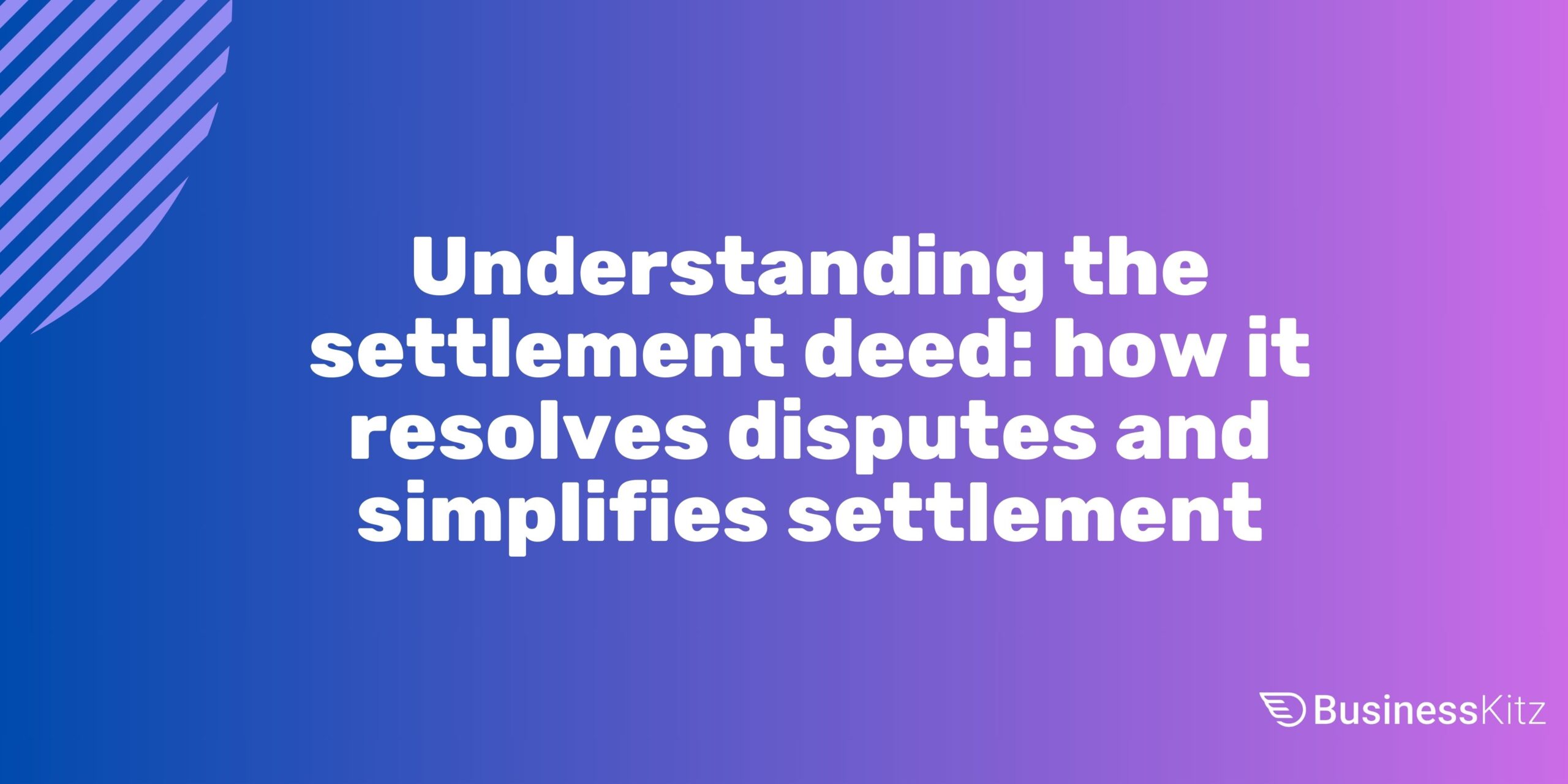
We've helped businesses save $55m with our all-in-one platform. Get instant access to this template and 115+ others, plus AI-powered document creation, starting completely free.
A settlement deed is a powerful tool for resolving business disputes. It provides a clear, legally binding agreement between parties, ensuring both sides meet their obligations. This guide will explain how a settlement deed works, when to use it, and how it can protect your business. Understanding its role can help you avoid lengthy legal battles and maintain smooth operations.
A settlement deed outlines the terms for resolving disputes and remains legally valid for a set period. The term can differ based on the nature of the dispute, ranging from months to years. If necessary, a settlement deed can be extended if obligations are still unmet or if new issues arise, ensuring ongoing protection for businesses.
A deed is a legally binding document that confirms an agreement between two or more parties. Unlike a standard contract, a deed does not always require consideration (payment or something of value) to be enforceable. Instead, the act of signing and delivering the deed shows intent to be legally bound.
A contract is a common way to form an agreement, but a deed provides stronger legal protection. Key differences include:
Businesses use deeds for different purposes, including:
FeatureDeedContractConsiderationNot requiredRequiredExecutionMust be signed and witnessedMay be verbal or writtenEnforceability12–15 yearsTypically 6 yearsCommon usesHigh-value or formal agreementsGeneral business transactions
A deed provides certainty and legal protection in business dealings. Using the right type of deed ensures clear, enforceable terms.
A settlement deed is a legally binding document that records the terms of a dispute resolution. It sets out the agreed terms between parties, ensuring that both sides fulfil their obligations. Unlike informal agreements, a settlement deed provides legal certainty and protects against future claims.
Businesses use settlement deeds to resolve disputes without costly litigation. By documenting the agreed terms, a settlement deed helps parties avoid future misunderstandings. It also provides a clear legal framework if one party fails to meet their obligations.
Key benefits include:
Businesses rely on settlement deeds to settle various disputes, including:
A real estate firm faced a contract dispute with a property developer over unpaid commission. Instead of going to court, both parties signed a settlement deed. The deed outlined payment terms and a timeline for completion. This allowed the firm to recover its funds without lengthy legal action, preserving business relationships.
A well-drafted settlement deed helps businesses resolve conflicts efficiently and protects their interests.

A deed of settlement is a practical way to resolve disputes without going to court. Businesses should consider using one when they want a legally binding agreement that saves time, money and stress. This approach works best when both parties want to settle a dispute quickly and avoid further legal action.
A settlement deed is ideal when:
Before drafting a settlement deed, businesses should assess:
FactorSettlement DeedCourt LitigationCostLowerHigher due to legal feesTimeQuick resolutionCan take months or yearsConfidentialityPrivatePublic recordEnforceabilityLegally bindingCourt-enforced but time-consumingBusiness ImpactMinimises disruptionCan distract from operations
A deed of settlement offers a fast and cost-effective way to resolve disputes. It helps businesses move forward while avoiding the risks of court battles.
A settlement deed must include clear legal terms to be valid and enforceable. These provisions define each party’s rights and obligations, ensuring the agreement is legally binding. Missing or unclear terms can lead to disputes or enforcement issues.
A well-drafted settlement deed should include:
ProvisionLegal SignificanceIdentification of partiesEnsures the correct parties are bound by the deedTerms of settlementDefines each party’s responsibilitiesConfidentiality clauseProtects sensitive information from disclosureDispute resolution clauseProvides a structured process to handle future conflictsPayment and indemnity termsEnsures financial terms are clear and prevents further claims
A settlement deed should be drafted with care to ensure enforceability. Clearly defined provisions reduce risk and help businesses avoid future legal complications.

The term of the deed refers to the period during which the settlement is legally valid and binding. It sets the timeframe for the parties to fulfil their obligations. After the term expires, the deed is no longer enforceable unless stated otherwise.
The duration of a settlement deed can vary depending on the industry and nature of the dispute. Some common examples include:
In some cases, the settlement deed may need to be extended or renewed. This typically happens when:
An IT company entered into a settlement deed with a client over a service contract breach. The deed set a one-year term for payment and performance. However, the client’s payment delays led to further disagreements. To prevent another dispute, the company extended the deed for an additional six months. This gave both parties enough time to meet the new conditions and avoid further legal action.
Understanding the term of the settlement deed and when it can be extended helps businesses stay protected while fulfilling their obligations.
A breach of a term occurs when one party fails to meet the obligations set out in the settlement deed. This can lead to serious consequences. The breach might cause delays, financial losses, or even further legal disputes. Understanding what to do if a breach happens is key to protecting your business.
The consequences of a breach can vary. They may include:
If a breach happens, the following steps should be taken:
By understanding what happens after a breach and taking preventative measures, businesses can reduce the likelihood of conflicts arising from settlement deeds.
Creating your key documents such as the settlement deed can be complex, but Business Kitz makes it easy. With just a few steps, you can generate your essential business documents tailored to your needs. Here’s how it works.
Business Kitz guarantees that all generated documents comply with Australian business law. The platform uses up-to-date standards and ensures that all terms and clauses are clear.

A settlement deed is a legal agreement used to resolve a dispute between parties. It formalises the terms of the settlement, ensuring that both parties meet their obligations under the deed. Unlike court proceedings, a settlement deed allows for a quicker and mutually agreed upon resolution.
Yes, a settlement deed can be extended or renewed if new disputes arise or if there are ongoing obligations. This is especially true when both parties want to avoid further legal proceedings and maintain a mutually beneficial resolution.
A deed of settlement will contain the details of the dispute, the terms of the settlement, and the obligations each party must fulfil. It may also include dispute resolution methods such as arbitration or mediation. Legal advice should be sought before finalising the deed to ensure all terms are clear and enforceable.
Yes, executing a deed of settlement can help avoid the lengthy and expensive litigation process. It provides an opportunity for both parties to resolve their dispute and move forward without the need for further legal proceedings. This is particularly relevant in business disputes where time and finances are important.
Small businesses benefit from a settlement deed as it allows them to resolve disputes efficiently, avoiding costly legal fees and lengthy litigation. By formalising the settlement, small businesses can prevent further disputes and focus on their operations. A deed of settlement can help in a variety of business matters, such as a dispute with another party or disagreements over financial obligations.
If one party fails to meet their obligations under the deed, the other party can pursue enforcement. This may involve seeking penalties, demanding payment, or taking legal action. Legal proceedings may continue if the breach is not resolved. In some cases, the deed may need to be extended to allow more time for compliance.
When a settlement deed involves a trust, the trustee must ensure that the terms of the deed are fulfilled in the best interests of the beneficiaries. The trustee is responsible for managing the trust’s obligations, and failing to do so can lead to legal consequences. It’s important to ensure the deed is consistent with the trust deed and the trustee's duties.
Yes, a settlement deed is enforceable in court if one party breaches the terms. In such cases, the party that has been harmed can take the deed to court to ensure the settlement is carried out. However, it is typically more efficient to resolve the matter without entering into legal proceedings, which is why dispute resolution methods such as arbitration or mediation are often included.
A settlor is the individual who creates a trust and ensures that the terms of the deed are in line with the trust’s purpose. In the context of a settlement deed, the settlor plays a key role in defining the terms that are agreed upon by all parties involved. The settlor's intentions must be clear and comply with legal requirements.
Yes, a settlement deed can be used in disputes regarding superannuation. The deed can formalise an agreement between the parties involved, including the distribution of superannuation funds. It is important that all parties understand their entitlements and obligations under the deed to prevent future legal disputes.
Yes, it’s always best to seek legal advice before executing a deed of settlement. A legal expert can help ensure the deed is enforceable, complies with relevant laws, and clearly outlines all obligations. Legal advice is particularly important when dealing with complex issues such as trusts or large sums of money.
If a breach of a settlement deed occurs, the first step is to attempt an informal resolution. This might involve renegotiating terms or offering more time to comply. If this doesn’t work, the next step is to seek legal advice and enforce penalties or pursue legal action through the court. In some cases, the deed may need to be extended.
Yes, a settlement deed can be used to resolve disputes involving a unit trust. The deed will outline the obligations of the parties involved, including the distribution of assets or payments related to the trust. This formalises the settlement and helps ensure that all parties meet their responsibilities in accordance with the trust deed.
A settlement deed offers a clear, legally binding way to resolve disputes. It saves time, reduces costs, and keeps issues private. This document is an effective alternative to litigation, helping businesses settle conflicts quickly and avoid future legal complications.
By using the right provisions and ensuring compliance, a settlement deed can protect your business interests and minimise risks. Whether you are resolving a partnership disagreement or finalising a contract dispute, a settlement deed provides certainty and closure.
For a faster, simpler, and secure way to create settlement deeds, try Business Kitz. With a few easy steps, you can ensure your business agreements are sound and ready for execution.
Copyright © 2025 Business Kitz 14312161